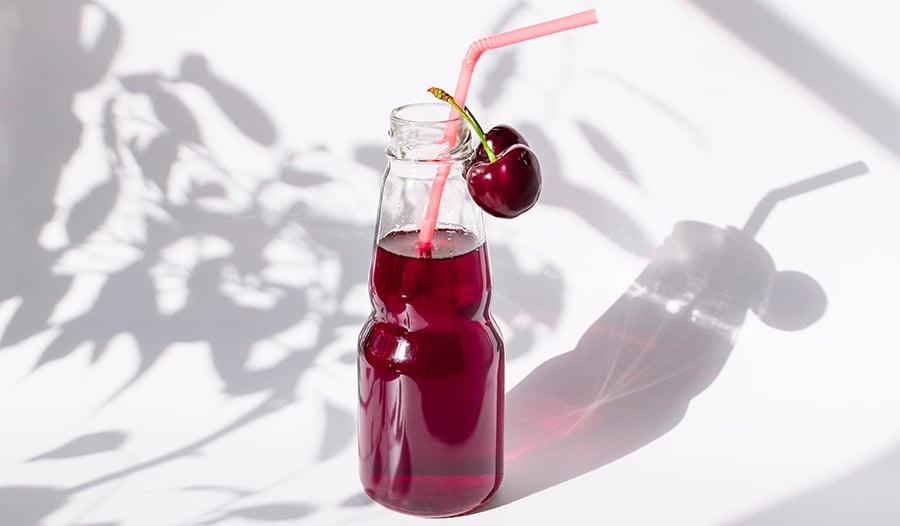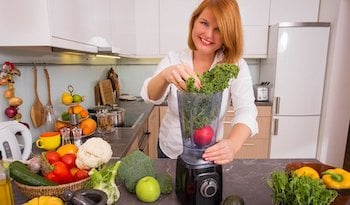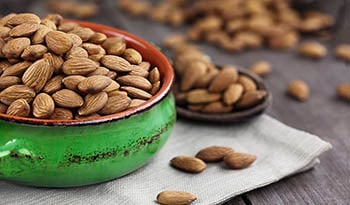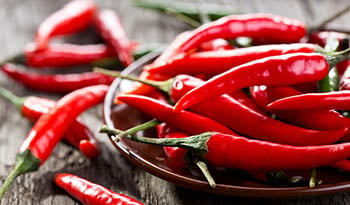Benefits of Tart Cherry Juice for Sleep
DISCLAIMER:This blog does not intend to provide diagnosis...
- In this article:
- What Is Tart Cherry?
- Research on Tart Cherry's Sleep Benefits
- Tart Cherry Forms and Dosage

Originally posted August 2019 / Updated June 2023
Sleep problems are an epidemic. And as problems with conventional prescription and over-the-counter sleeping pills mount, people are looking to natural alternatives to help achieve a good night’s sleep. Thanks to recent scientific investigations and TikTok, an emerging natural sleep aid is tart cherry. Its sleep-promoting properties have been confirmed in three human clinical trials.
What Is Tart Cherry?
Cherries are native to Europe and Western Asia but have now spread worldwide. There are two basic types of cherries—sweet and tart. Most people are familiar with sweet cherries like the dark, rich Bing cherry that grows particularly well in the Pacific Northwest of the United States.
Tart cherries are sour, not sweet, as the name implies. The state of Michigan grows more than 70% of the tart cherries in the United States. The Montmorency variety is the most popular.
In addition to taste, sweet and tart cherries have slightly different phytochemicals. Both contain unique flavonoids, known as anthocyanins, responsible for their respective colors and biological activities, such as exerting antioxidant and anti-inflammatory effects.
What sets tart cherry apart is that it is a food source of melatonin. However, the concentration is nowhere near the same level as typical dosage levels for melatonin as a sleep aid.
But that does not matter much as positive results in sleep studies led researchers to express their belief that the effectiveness of tart cherry as a sleep aid results from a synergistic effect of its melatonin and phytochemical component.
Research on Tart Cherry's Sleep Benefits
There have been three human clinical trials with tart cherry juice as a sleep aid. In the first study, the effect of tart cherry juice (240ml twice a day) or placebo over two weeks on sleep quality in individuals older than 65 with poor sleep quality.
The 15 subjects were randomized to take a placebo (2 weeks) or cherry juice (2 weeks), separated by a 2-week washout, and then crossed over to receive the other substance. Results showed tart cherry juice produced a significant 62-minute improvement in how long subjects were awake after sleep onset.
The second study was a double-blind, placebo-controlled study. Twenty volunteers (10 men and ten women between 18-40 years old) consumed either a placebo or tart cherry juice concentrate (30 ml) for seven days. Results showed several positive effects with tart cherry supplementation. Most importantly, total sleep time and sleep efficiency improved significantly. And a key finding was that blood level measurement of melatonin was also considerably elevated only in the cherry juice group.
The third study was conducted on subjects older than 50 with chronic poor sleep quality. Sleep issues are common in the elderly and are linked with reduced quality of life and increased prevalence of cognitive decline, depression, and worsening of chronic health conditions like type-2 diabetes and high blood pressure.
The subjects were randomized to take a placebo (2 weeks) or cherry juice (2 weeks), separated by a 2-week washout, and then crossed over to receive the other substance. Results showed that the tart cherry group increased sleep time by 84 minutes based on brain wave monitoring.
Tart cherry also produced improvements in sleep efficiency (the time required to get to sleep [and stay asleep). This study looked at the serum kynurenine to tryptophan ratio as a possible mechanism of action for tart cherry.
Tryptophan is the precursor of serotonin and melatonin, two neurotransmitters involved in sleep onset and maintenance. Kynurenine is a tryptophan degradation product that can impair the conversion of tryptophan to serotonin and melatonin. The ratio of kynurenine to tryptophan predicts insomnia and poor sleep quality. In this study in elderly subjects, tart cherry juice concentrate reduced the ratio of kynurenine to tryptophan, indicating that more tryptophan could be converted to serotonin and melatonin.
What the results from these three studies shows is that tart cherry has the ability to improve sleep quality. However, this effect has little to do with it supplying melatonin alone. The dosage level of tart cherry juice and concentrate used in these studies would provide at most 85 mcg of melatonin.
The typical dosage of melatonin as a sleep aid is 3 to 5 mg, which translates to 3,000 to 5,000 mcg or at least 30 to 50 times the level provided by the tart cherry preparations. There is more going on than tart cherry supplying melatonin. Several researchers have expressed their belief that the effectiveness of tart cherry as a sleep aid results from a synergistic effect of its melatonin and phytochemical component. The existing data supports that belief.
Tart Cherry Forms and Dosage
Tart cherry comes in a several forms: juice, juice concentrate, and concentrated dry extract. All can be effective. To improve sleep, taking tart cherry before the evening meal is generally recommended. The dosage for tart cherry juice is 240 ml, concentrate 30 ml, and powder 500 mg.
References:
- Kirakosyan A, Seymour EM, Urcuyo DE, et al. Chemical profile and antioxidant capacities of tart cherry products. Food Chemistry 2009;115:20-25.
- Pigeon WR, Carr M, Gorman C, et al. Effects of a tart cherry juice beverage on the sleep of older adults with insomnia: a pilot study. J Med Food. 2010;13:579–583.
- Howatson G, Bell PG, Tallent J, et al. Effect of tart cherry juice (Prunus cerasus) on melatonin levels and enhanced sleep quality. Eur J Nutr. 2012;51:909–916.
- Losso JN, Finley JW, Karki N, Liu AG, Prudente A, Tipton R, Yu Y, Greenway FL. Pilot Study of the Tart Cherry Juice for the Treatment of Insomnia and Investigation of Mechanisms. Am J Ther. 2018 Mar/Apr;25(2):e194-e201.

 By Dr. Michael Murray, N.D.
By Dr. Michael Murray, N.D. 


